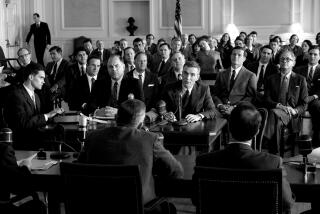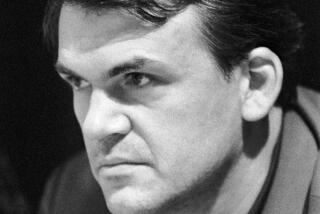A novel steeped in all things Russian
- Share via
The Commissariat of Enlightenment
A Novel
Ken Kalfus
The Ecco Press: 296 pp., $24.95
*
Heralded as that much-feared and awe-inspiring creature, the Novel of Ideas, Ken Kalfus’ first full-length work of fiction lives up to its billing -- and then goes on to break the mold. Kalfus, whose two previous collections of irreverent, inventive short stories have already roused significant attention, would appear to be an autodidact in the finest way; that is to say, out of necessity and passion. Like his previous stories, the novel “The Commissariat of Enlightenment” reflects a fascination with and knowledge of nearly all things Russian and particularly Soviet Russian: from language, art, religion and literature to history, politics and that doughty conundrum, the “Russian soul.” Few novelists would be well-advised to set their work in a “foreign” country, with “foreign” dramatis personae. But this writer’s empathetic vibration with Russia runs so deep and true that the reader never questions his authority to speak.
“The train jolted forward so abruptly that the three passengers in the first-class coach sensed that they had been propelled much farther than a few meters from the Tula station. One of the men (Gribshin) felt as if he had been thrust from the era in which he lived. The second man (Vorobev) perceived that he had been jerked out of a manner of thought that had become complacent after years of discovery; the third man (Khaitover), who had been resting with his eyes closed, now sprung them wide, as if he had been suddenly brought to life. The three men had not yet made each other’s acquaintance.”
Thus the opening paragraph of “The Commissariat of Enlightenment,” worth quoting in its entirety because it holds from the very start some of the book’s more striking aspects. There is the informed use of language: the passengers “sensed” or “perceived” real changes, whereas the terms “felt” and “as if” apply to more subjective impressions. There is the economy of telling: here, in these first lines, under the title “1910,” we meet the main character, Kolya Gribshin (a young cinema-adept hired by the famous newsreel producers Pathe Freres) as well as two others who will continue to cross his life’s path in significant ways. We find clues to location, social class, and not least, to the fact that science and technology will play an important part in what is to come. Finally, there is the specific rhythm: a measured cadence that keeps stride with the historical setting, the era and its literature. Not often encountered in contemporary, “literary” fiction, this is the cadence of a Dickens or a Tolstoy, evoking what many would call the classical high period of the novel. As such, it rouses certain almost Pavlovian expectations: of a novel filled with incident and reversals, not to mention colorful individuals, their backgrounds painstakingly delineated, with whom we will come to identify, suffer with and, hopefully, share some delight.
Irony and the rustle of driest humor abound in this novel. Indeed, our three travelers are en route, each for his separate purpose, to the tiny, drab village of Astapovo, where none other than Count Leo Tolstoy himself, ever on the run from his harridan spouse, lies dying. But is this the plot-machine of traditional fiction? “The Commissariat” has something else for us in mind.
The wellspring of Kalfus’ intent is more than hinted at when the image-intoxicated student Kolya first ruminates on the new phenomenon of cinema, come to re-energize the old burlesque theaters of Moscow: “All over the world, men, women and children stared at cinema screens for hours at a time, alert and motionless, backs straight and arms at their sides -- a posture still relatively unfamiliar. The cinema had seized the human imagination. Now we saw ourselves as if filmed, flat and inaudible, inhabitants of flickering, rectangular space, and novelists began composing their literary scenes as if the protagonists were viewed through camera lenses, engaging in brief episodes separated by blackouts.”
This is not to imply that Kalfus’ novel lacks dialogue -- on the contrary, Gribshin’s exchanges with historical and imaginary figures, from his hero Stalin to the orphan girl he first falls for and then violates, crystallize into highly dramatic episodes. All the now usual movie techniques are brought into play -- backlighting and panning, fades and distance shots -- though in this text with deft self-awareness. (Intriguingly, Kalfus has rendered all his scenes in sharp tones of gray.) But it is the “blackouts” that exert a sort of tyranny on the novel. Whole decades of Gribshin’s life are swallowed by oblivion, but a greater loss to fiction than time is the loss of feeling: of desire, longing, any motivation other than a rather bloodless urge to see his concept of movie-making enter and alter the stream of history. Gribshin’s manifesto-like ideas do alter with age and the appalling experiences of the Revolution, and glimpses of inner conflict appear here and there. But his heart, like that of every other person in the book, remains essentially mute.
What stuff, then, can substitute for characters’ emotions here, much as an embalmer’s fluid might substitute for blood, creating a body just as amazing to look on, and infinitely more lasting? Here, it’s the writer’s spirit. Inquisitive, undeflected and fearless, whether illuminating miracles in terms of the dialectic or examining the similarities between holy icons and Ronald McDonald, “The Commissariat of Enlightenment” fulfills its mandate, richly.
More to Read
Sign up for our Book Club newsletter
Get the latest news, events and more from the Los Angeles Times Book Club, and help us get L.A. reading and talking.
You may occasionally receive promotional content from the Los Angeles Times.







